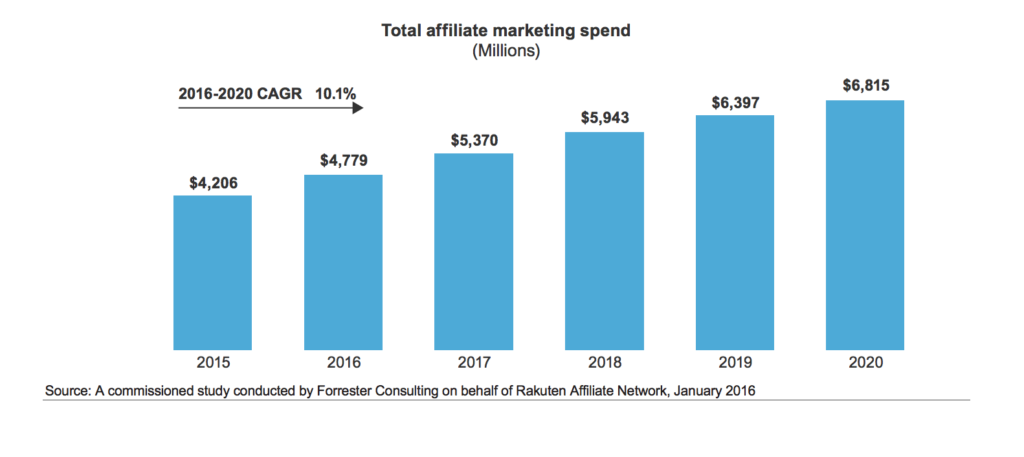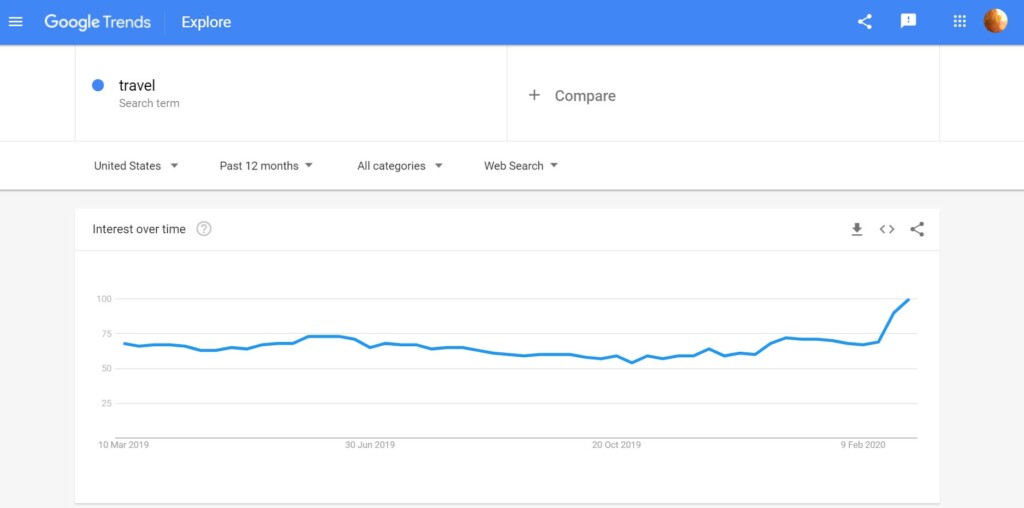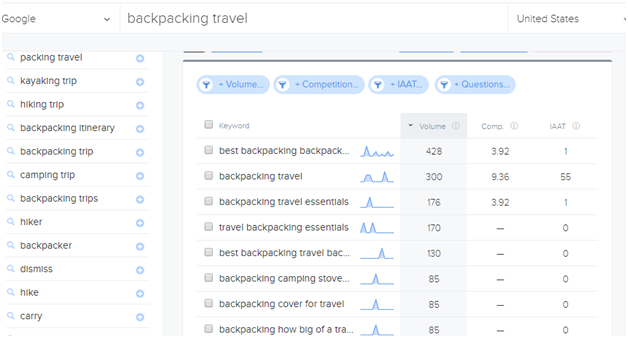Benefits of Becoming an Affiliate Marketer
If you aren’t familiar with the concept of affiliate marketing, here is a simple explanation. It is an advertising strategy that merchants use in order to reach a wider audience. They partner with influencers in their niche and pay a commission for each sale made through the link that influencers promote.
This type of business involves low risks, and the growth of investments it attracts increases every year:

Let’s consider the benefits of becoming an affiliate more closely:
- Easy to start: You can become an affiliate marketer with or without a website
- A great way to generate passive income and keep your current job at the same time
- No need to have advanced marketing skills or being a web developer, as you’ll get affiliate marketing training along the way
- A great business opportunity that doesn’t require you to create your own product or invest a lot to get off the ground
- You’ll be provided with all the necessary tools to start promotion
- It’s possible to advertise various offers at the same time
- Most networks help their influencers get in affiliate marketing
Steps to Becoming an Affiliate Marketer
If you decided to become an affiliate-marketing specialist, we’ll fly you through the main steps of this journey and explain how to succeed in each one of them.
Research the Market
First and foremost, you need to choose a niche to compete in. It should correspond to your interests and opportunities/skills, be currently in demand and feature significant scope for growth.
Start with your own interests and skills. Try to evaluate the knowledge you possess and think of the niches and products it corresponds to. Basic line, you’ll spend the next few months diligently researching the niche, so it should at least be interesting.
Then, try to assess the potential profitability of the options chosen. Tools such as Google Trends may be very helpful in this case because they allow you to see the search volume for the keywords in the niche and analyze metrics such as location, seasonality, etc. For example, let’s check how trendy backpack traveling is. We can see that its popularity fluctuates a lot over the year.

In the next screen, you can also see that the number of searches varies by region.

These are just a few insights that diligent research can bring you, so don’t disregard this step.
It’s also crucial to analyze the competition. Try to check the following things:
- Keywords your competitors rank for
- Their search volume, difficulty to rank and growth over time
- Your chances of getting on top of search results in this niche
- The sources of traffic for your competitors
- The number of backlinks they have, etc.
A range of tools can assist you in this effort. The screen below demonstrates the example of the keyword research in on the free Wordtracker service:

Another option is to check products to promote on ClickBank, which shows the average income you’ll make on each product sale.
Pick Affiliate Programs
To become an affiliate specialist, you might need to look through dozens, if not hundreds, of programs and choose the ones that suit you better. If researching the travel niche, consider joining Travelpayouts. It is the largest travel CPA affiliate network offering dozens of advertisers to promote. You can join one or several programs.
To not miscalculate, consider the following criteria when choosing an offer:
- Product’s quality and price segment
- Merchant’s reputation
- Conversion rates
- Affiliate reward
- Promotional tools available
- Cookie duration
- Level of competition
- Payment process (period, systems, the risk of refunds, etc.)
- Allowed traffic sources and requirements for affiliates
- Target audience
You’ll receive profits, but only if the income from your affiliate program will be higher than the costs of traffic that you bear.
Build a Website
First of all, it is not necessary to be a blogger to join affiliate marketing, but having a website will ease the process a lot, as affiliate-marketing blogs are able to provide their owners with significant benefits. In this case, it will be easier to promote a product, and in the long term, you’ll be building a community and your brand name.
Here are the basic steps of building a website:
- Choose a blogging platform (some of them offer packages including hosting and domain name, so try to find the most suitable option)
- Pick your domain name
- Select a hosting provider
- Find a suitable theme and install plugins
- Fill the website with unique and useful content
- Optimize constantly
- Grow the email list
Prepare Content
There are various types of content that you can publish on your website. It can be long-reads, product reviews or e-books, affiliate-marketing courses, webinars, infographics, videos, etc.
Regardless of its type, content should be unique, informative and contain relevant keywords so that it can be easily found by search engines and be valuable to readers. Remember to always provide valid facts, visuals, statistics, videos and other materials.
You can write content yourself, use article-writing services, or even look for some free blog posts. To deliver posts on a regular basis, it is important to find blog content ideas.
Run Ads
To promote your campaign or even become an affiliate marketer without a website, you can make use of Google Ads. This is the most popular advertising platform today, allowing you to drive traffic to your own blog or directly to a merchant’s website. Just make sure that your advertiser doesn’t forbid running ads.
To start with Google Ads, it’s necessary to sign it up with your Google account. Set your budget, choose a target audience, pick a network (whether it will be Google’s Search or Display Network), add keywords and set your bids on them. Then, create ads and launch your campaign.
You can also use Facebook Ads, as Facebook features a monthly audience of over two billion people. In this case, your ad will appear on Facebook, Instagram and other networks or just on one of them. It is easy to set up an ad, just follow the instructions and set up your budget for the auction.
Leverage Social Media
If you have no desire or opportunities to create your own website, it’s possible to gain affiliate marketer skills by promoting offers on social media. Here are some tips to succeed:
- Post-high-quality and informative content
- Add visuals to capture attention
- Place redirect links since the affiliate ones are easy to identify
- Be active and responsive
Your success also depends on social media networks:
- On Facebook, it’s better to start a business page for your affiliate needs.
- Twitter is remarkable for its high dynamics, so tweets gain attention and lose it within a few hours. To succeed here, try tweeting no less than 5–10 times a day to stay visible to your audience.
- Instagram is well known for its notorious link sharing limitations but it allows unlimited opportunities for sharing visuals and networking with influencers.
- LinkedIn is a platform for building professional connections. You can build free company pages to inform people about products and offers you promote. To create your community, add potential customers as connections.
Build a Mobile App
Affiliate marketing is a great way to monetize mobile apps. You can create an application with one of the app makers such as Appy Pie, Shoutem, Swiftic, or take advantage of Travelpayouts’ free SDK to earn money on flight tickets.
The Most Common Mistakes to Avoid
There are some steps that can lead to your campaign’s failure. Here are some of them:
- Placing too many ads and/or links on one webpage
- Offering irrelevant offers for your audience
- Relying on search traffic only
These are just a few examples of affiliate mistakes to avoid. The most important tip might be to first provide value, and only then promote offers. Otherwise, people won’t be incentivized to spend time on your website.
How to Become a Successful Affiliate Marketer
Becoming an affiliate expert is no hard job, it just requires constant effort and knowledge of your niche, product and target audience. You can start earning commission with your own blog, social media profile, mobile application or by running ads.
Whatever platform you choose, remember to deliver informative and unique content, insert links correctly and monitor your campaign along the way to fix problems right on the spot.




